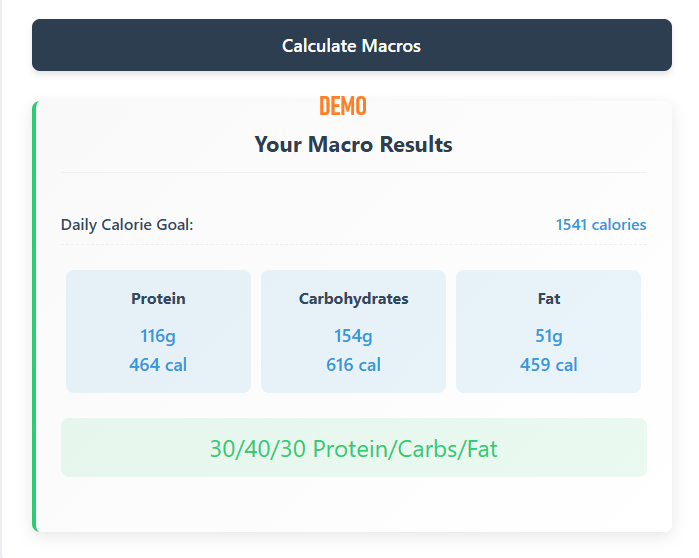
Macronutrients (macros) are the three main nutrients that provide energy: protein, carbohydrates, and fats. Each plays a unique role in your body and should be balanced according to your specific goals.
How the Macro Calculator Works
This calculator first determines your Total Daily Energy Expenditure (TDEE) based on your personal information and activity level. It then adjusts your calories based on your goal (weight loss, maintenance, or muscle gain) and splits those calories into the optimal ratio of protein, carbs, and fats.
Macronutrient Guidelines
Here are general recommendations for each macronutrient:
Protein
- Weight Loss: 1.2-1.6g per kg of body weight (0.5-0.7g per lb)
- Maintenance: 1.0-1.2g per kg (0.45-0.55g per lb)
- Muscle Gain: 1.6-2.2g per kg (0.7-1g per lb)
Carbohydrates
- Weight Loss: 30-40% of total calories
- Maintenance: 40-50% of total calories
- Muscle Gain: 45-55% of total calories
Fats
- All Goals: 20-35% of total calories
- Minimum 0.5g per kg (0.23g per lb) for hormone function
Why Track Macros?
Tracking macros provides several benefits:
- Ensures you're getting enough protein to preserve muscle
- Helps manage energy levels through proper carb intake
- Supports hormone health with adequate fats
- Allows for flexible dieting while staying on track
- Provides better results than just counting calories alone
What Are Macros and Why They Matter in Nutrition
Our bodies need three main nutrients to survive and function properly – they are called macronutrients, or macros for short. These macros are protein, carbohydrates, and fat.
- Each macronutrient provides our bodies with energy:
- Protein helps build body tissue and is needed to grow or maintain muscle.
- Carbs are the body’s main source of energy, especially for those who work out a lot.
- Fat is used for hormone production, cell formation, and as a long-term source of energy.
Most people only focus on calories, but understanding what the macros are and developing eating habits accordingly can make it much easier to improve your body composition and health.
How to Calculate Macros Based on Your Goals
Everyone’s body, goals, and lifestyle are different. So how to calculate macros depends on what you want – to lose weight, gain muscle, or just maintain weight.
For weight loss (Cutting): More protein, less fat, and moderate carbs are taken.
For weight gain (Bulking): More carbs and protein are needed.
For weight maintenance (Maintenance): A balanced macro split is followed.
If you want, you can calculatemacros manually using some formulas. For example:
- Total Calories = BMR × Activity Level
- Protein: 1 gram per pound of bodyweight
- Fat: 0.3–0.4 gram per pound
- Rest of calories → Carbs
However, this calculation can be complicated for many. That is why our macro calorie calculator or macro calculator free tool has been created, which automatically tells you the right amount of macros according to your goals.
Use Our Free Macro Calculator Tool
Our free macro calculator is very easy to use and absolutely free for everyone.
You just need to enter a few details:
- Age
- Weight
- Height
- Gender
- Activity Level
- Goal (lose, gain or maintain weight)
After entering this information, our macro tracker will show you the gram-by-gram calculation of protein, carbs and fat.
You can also use these results as a daily macro counter to plan your meals.
What Should My Macros Be?
"What should my macros be?" – This is a question many people ask. The answer depends on your body type, daily activity and personal goals.
Some common popular macro splits:
40/40/20 → 40% carbs, 40% protein, 20% fat (Balanced diet)
High-Protein Diet → Those who want to lose fat or gain muscle
Keto Diet → 75% fat, 20% protein, 5% carbs
You need to change your macros based on your gender, age, weight, and activity level. For example, men generally need more protein for muscle maintenance.
Our macro calculator for weight loss will help you give you customized information, so you can easily understand which macros for weight loss or macros to lose weight are suitable for you.
Counting Macros vs Counting Calories – What’s Better?
Many people ask, “Should I count macros or should I just count calories?” The simple answer to this question is: you need to decide based on your goals.
Calorie counting is enough if you just want to lose weight.
But if you want to build muscle, lose fat, and optimize your health, counting macros for weight loss is much more effective.
Because macros are how we know what kind of energy is coming from a food – this is not possible just by knowing calories. Proper macro intake helps you improve your body composition.
So, it is better to give a little more importance to macros in the macro vs calorie debate.
Best Macro Tracking Apps You Can Try
Here are some of the best macro tracking apps to keep track of your daily macros, which you can use on mobile or web:
MyFitnessPal – Very popular and user-friendly
Cronometer – Provides science-based analysis
Carb Manager – A good option if you are following keto
Lose It! – Simple UI and customizable macro goals
MacroFactor – Helpful with advanced features and AI
These apps help you keep track of your macro counter, track food intake, and meet your daily goals.
.png)